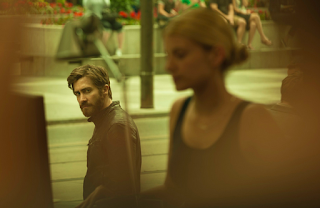2014’s “Enemy” by Denis Villenueve.
Starring Jake Gyllenhaal, Melanie Laurent, Sarah Gadon, and
Isabella Rossellini.
Based off of Pulitzer Prize winner for literature winner
Jose Saramego’s novel, “The Double”, in his second English film Veillenueve
shows off his suspense building talents around the twisting narrative adapted
by Javier Gullon.
Gyllenhaal plays a history teacher, giving lectures on dictatorships’
methods of control. He has a girlfriend (Laurent), whom he’s intimate with, but
often won’t spend the night. On a recommendation from a coworker, Gyllenhaal rents
a movie. He discovers a doppelganger of himself in the movie (Gyllenhaal again),
and becomes obsessed with locating him. We then meet the doppelganger, an actor
with a more assertive personality, with a pregnant wife (Gadon). Things become
muddled, as both personalities alternate between anxious avoidance, and wanting
to see what the other’s experience feels like.
Those seeking an orderly and procedural exercise will be baffled by Gullon’s script,
as “Enemy” takes the existential mind trip of “The Double” and recalls “Fight
Club” by way of Hitchcock. Even the extremely warm tones of “Enemy” recall
Fincher’s unnatural palette, as it is as yellow as “The Curious Case of
Benjamin Button” is orange. Danny Bensi and Saunder Jurriaans’s score keep
things anxiously alienating, and Toronto (actually playing itself for once) has
never looked so foreboding (Look at that traffic on the 401!). Gyllenhaal puts
in 2 solid performances, but neither 1 of them is particularly that
interesting, especially when compared to the source novel. It is possible that the introduction of arachnids is intended as an explanation to the overall plot as well. While the adaptation lacks the novel's Dostoevskian psychology, and the meandering
can be a trifle sadomasochistic at times, the creeping tone of “Enemy” makes it a friend of mine.
3.5/5




































